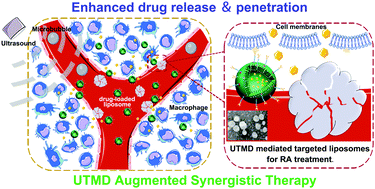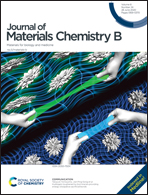Ultrasound-targeted microbubble destruction augmented synergistic therapy of rheumatoid arthritis via targeted liposomes†
Abstract
Rheumatoid arthritis (RA) can lead to joint destruction and deformity, which is a significant cause of the loss of the young and middle-aged labor force. However, the treatment of RA is still filled with challenges. Though dexamethasone, one of the glucocorticoids, is commonly used in the treatment of RA, its clinical use is limited because of the required high-dose and long-term use, unsatisfactory therapeutic effects, and various side-effects. Ultrasound-targeted microbubble destruction (UTMD) can augment the ultrasonic cavitation effects and trigger drug release from targeted nanocarriers in the synovial cavity, which makes it a more effective synergistic treatment strategy for RA. In this work, we aim to utilize the UTMD effect to augment the synergistic therapy of RA by using polyethylene glycol (PEG)-modified folate (FA)-conjugated liposomes (LPs) loaded with dexamethasone sodium phosphate (DexSP) (DexSP@LPs-PEG-FA). The UTMD-mediated DexSP@LPs-PEG-FA for targeted delivery of DexSP including a synergistic ultrasonic cavitation effect and drug therapy were investigated through in vitro RAW264.7 cell experiments and in vivo collagen-induced arthritis SD rat model animal experiments. The results show the DexSP release from targeted liposomes was improved under the UTMD effect. Likewise, the folate-conjugated liposomes displayed targeting association to RAW264.7 cells. Together with the application of ultrasound and microbubbles, liposomes-delivered DexSP potently reduced joints swelling, bone erosion, and inflammation in both joints and serum with a low dose. These results demonstrated that UTMD-mediated folate-conjugated liposomes are not only a promising method for targeted synergistic treatment of RA but also may show high potential for serving as nanomedicines for many other biomedical fields.



 Please wait while we load your content...
Please wait while we load your content...